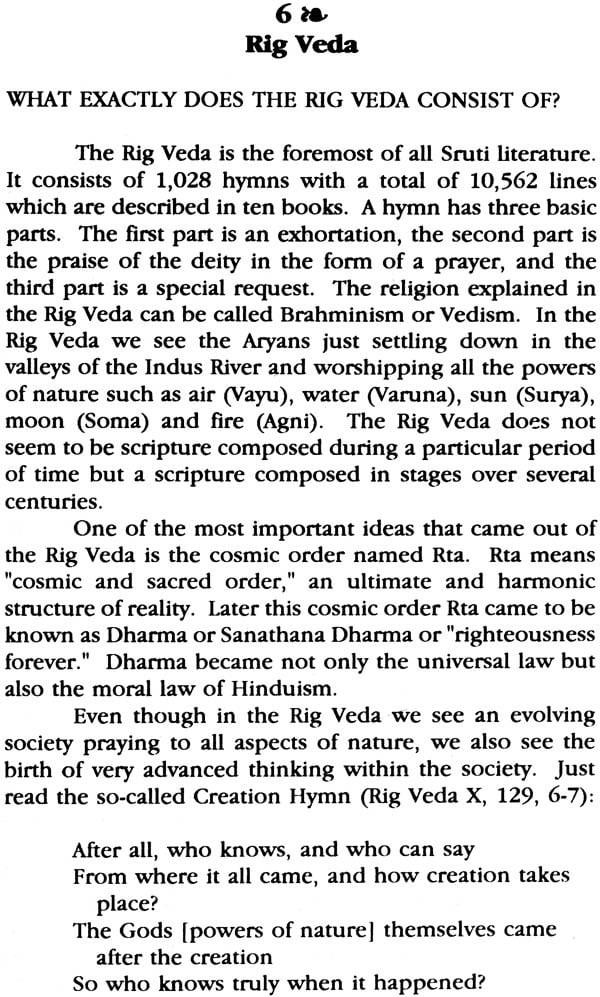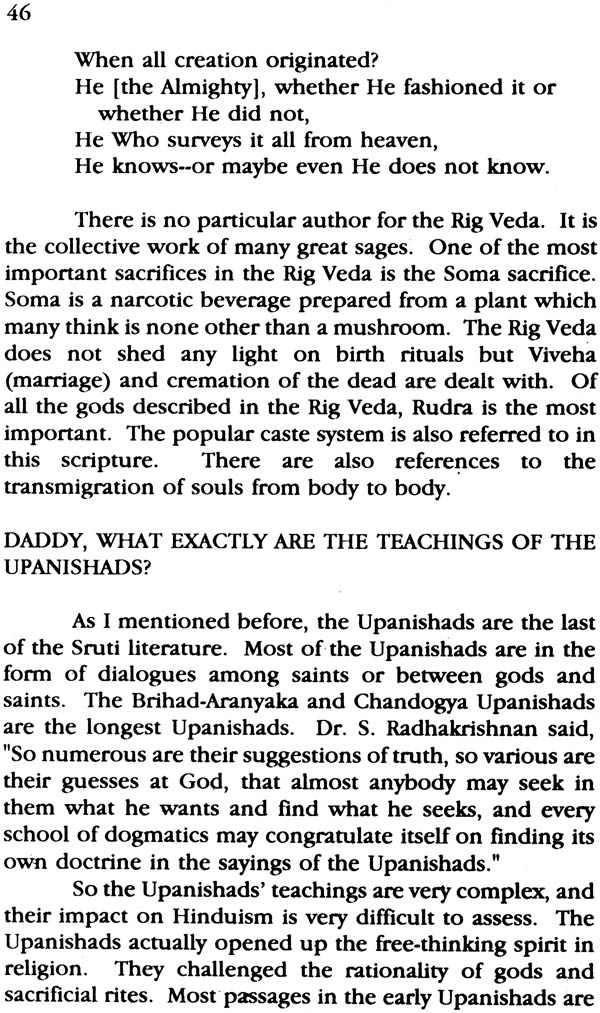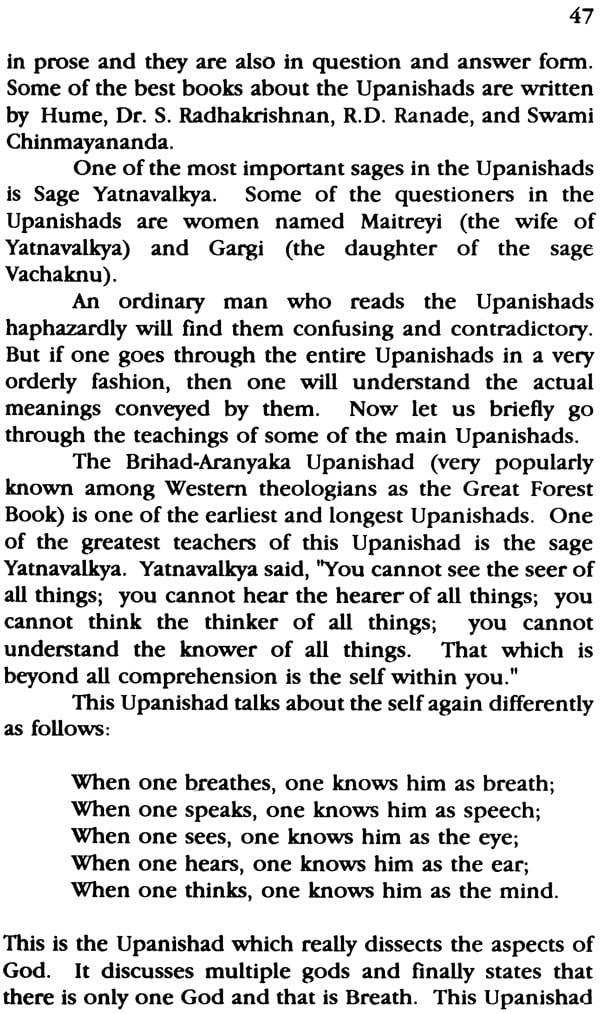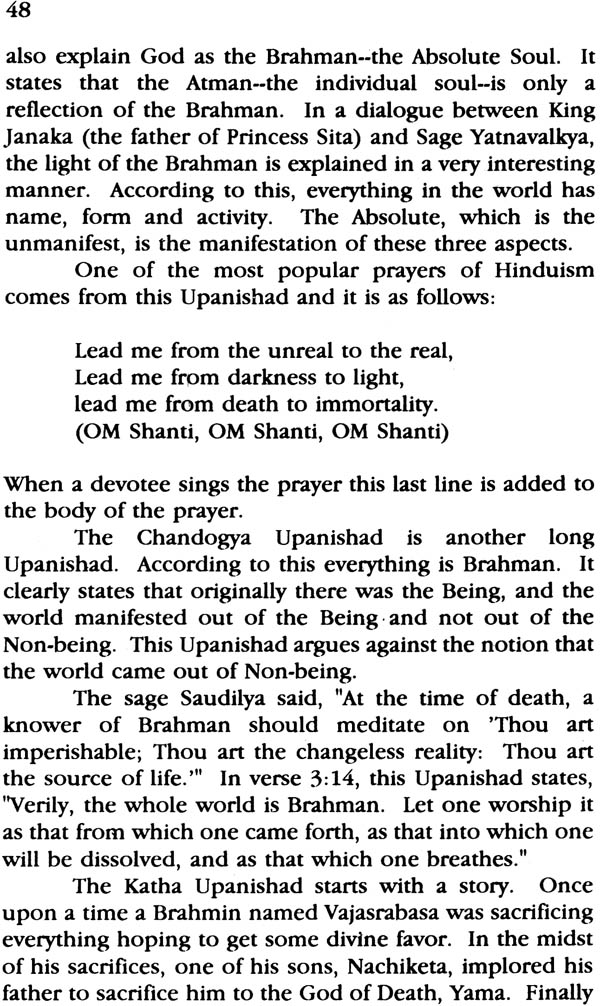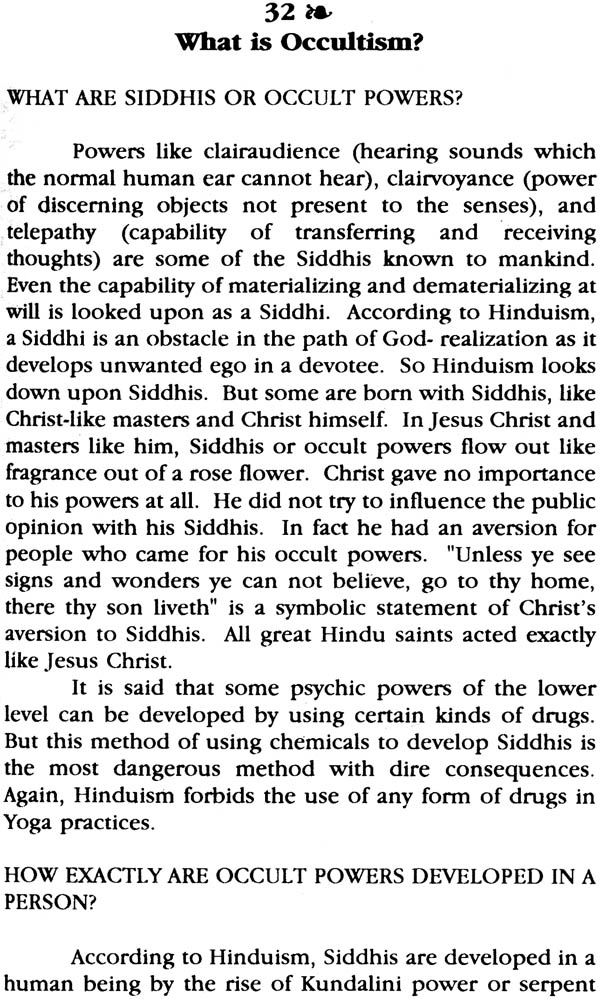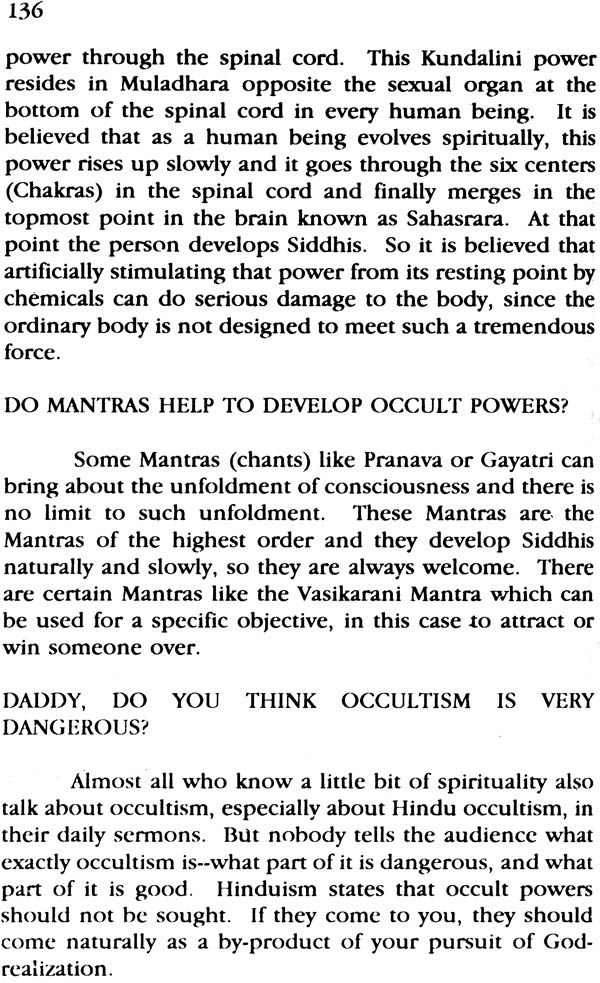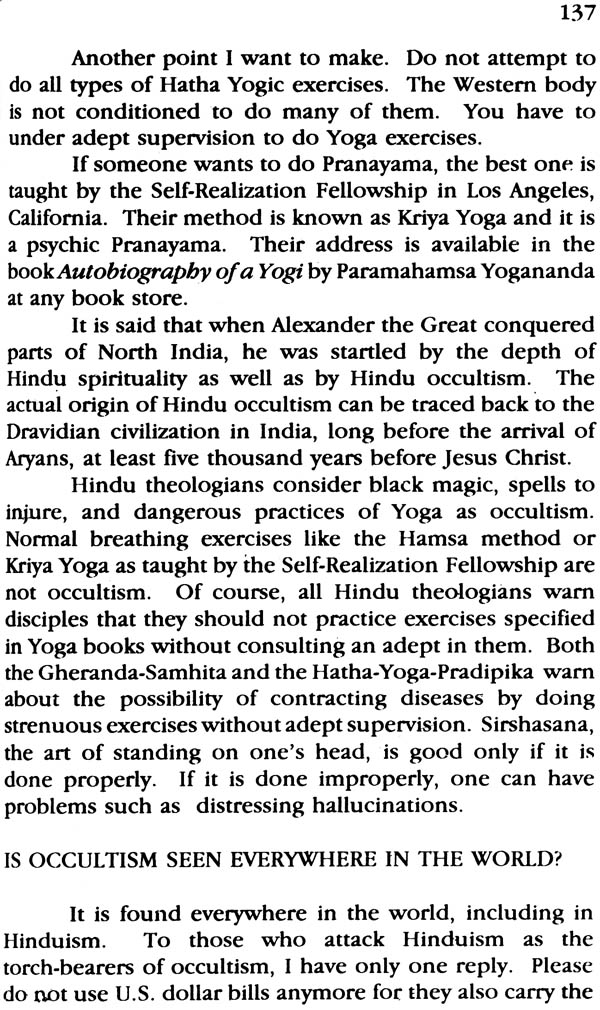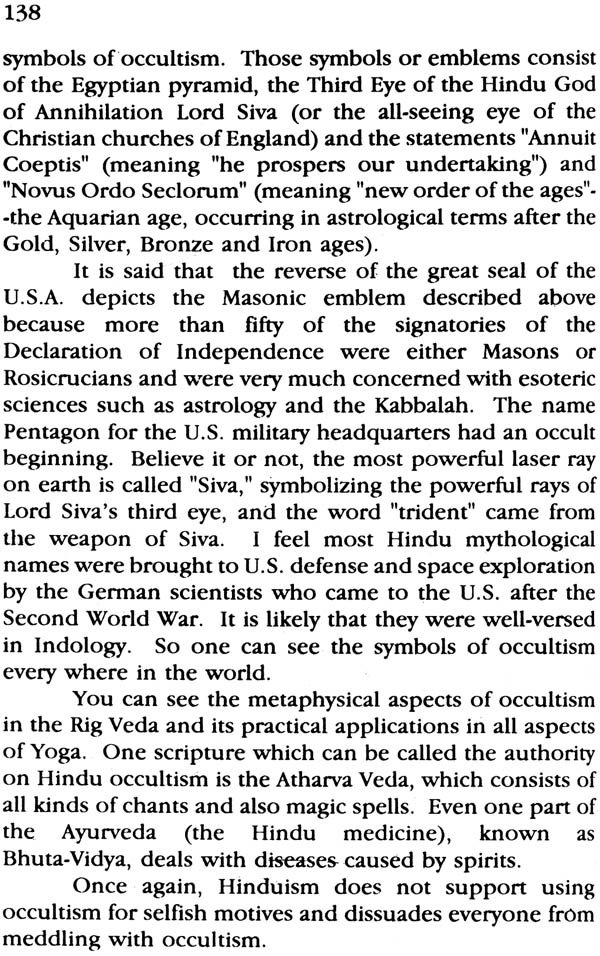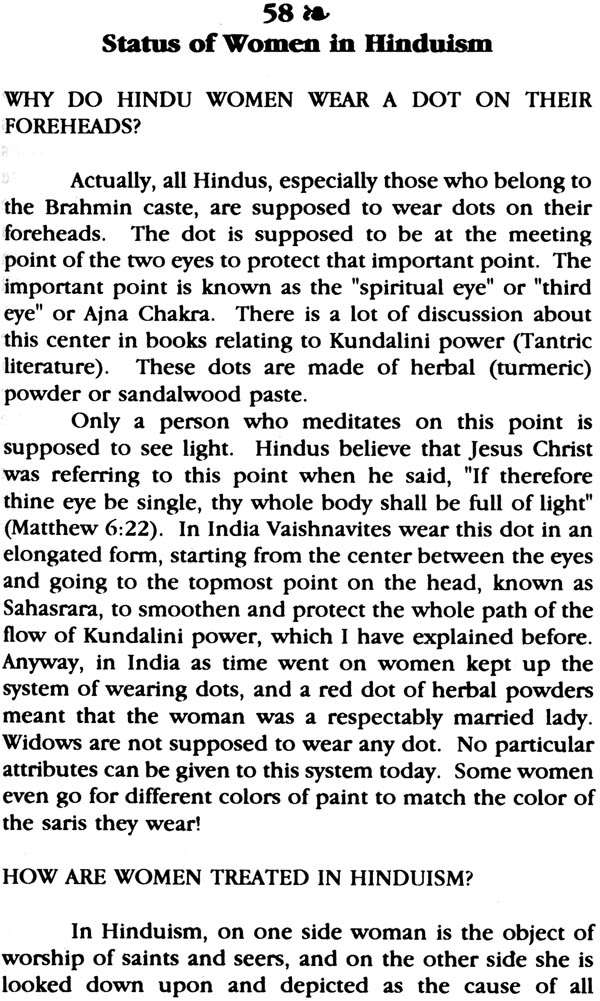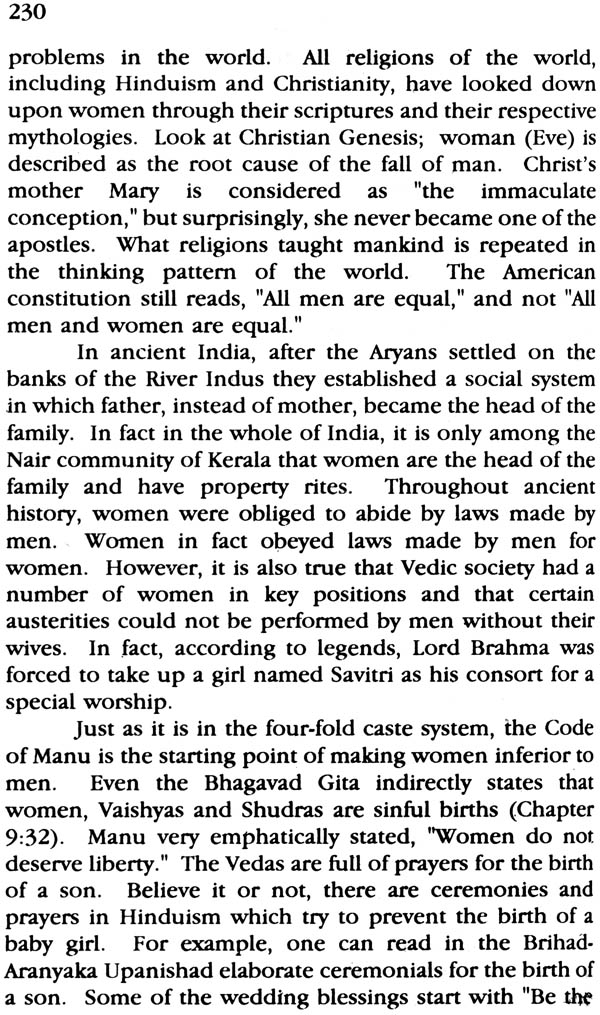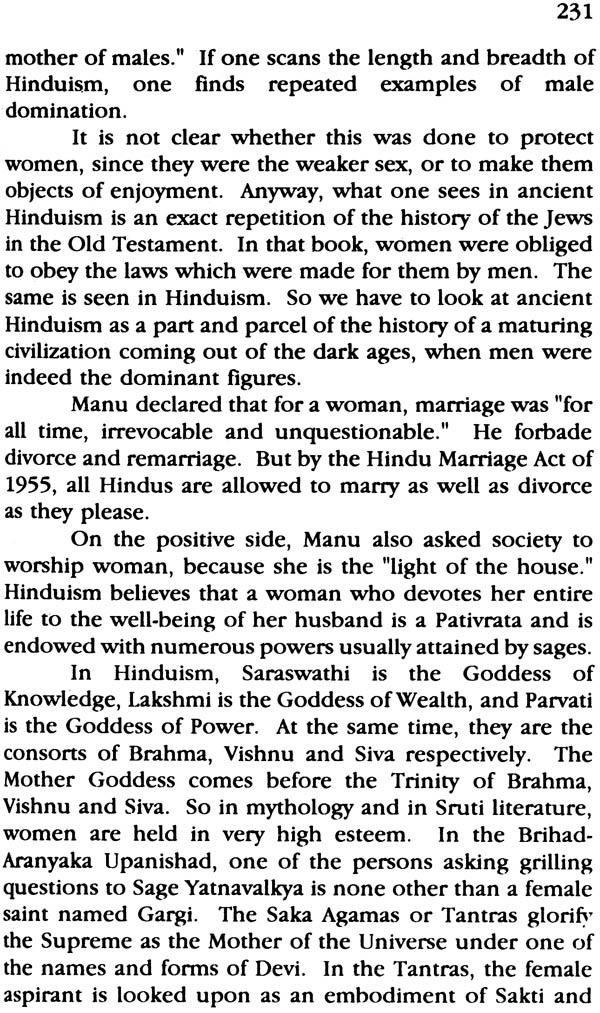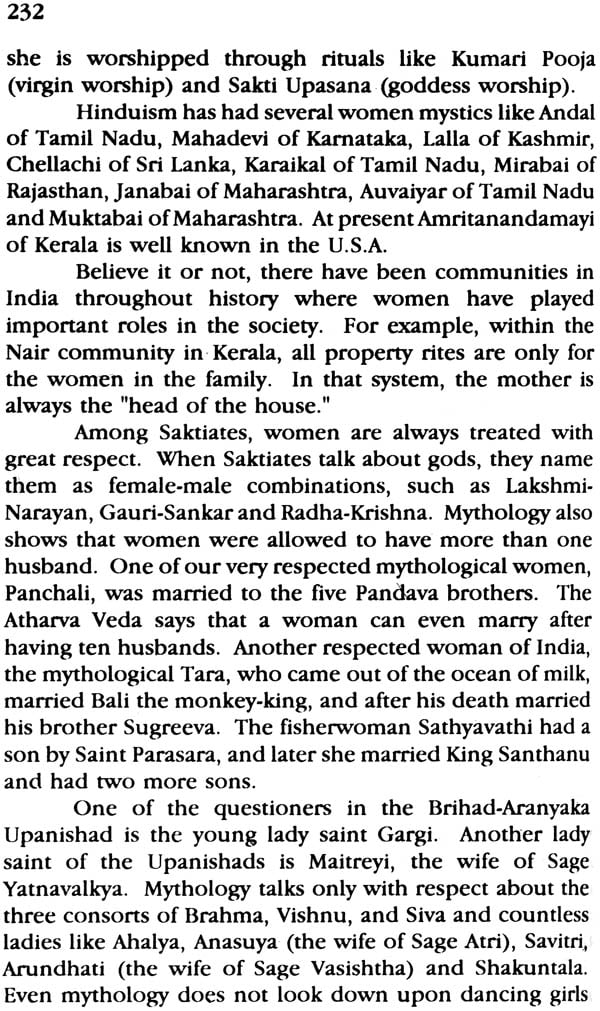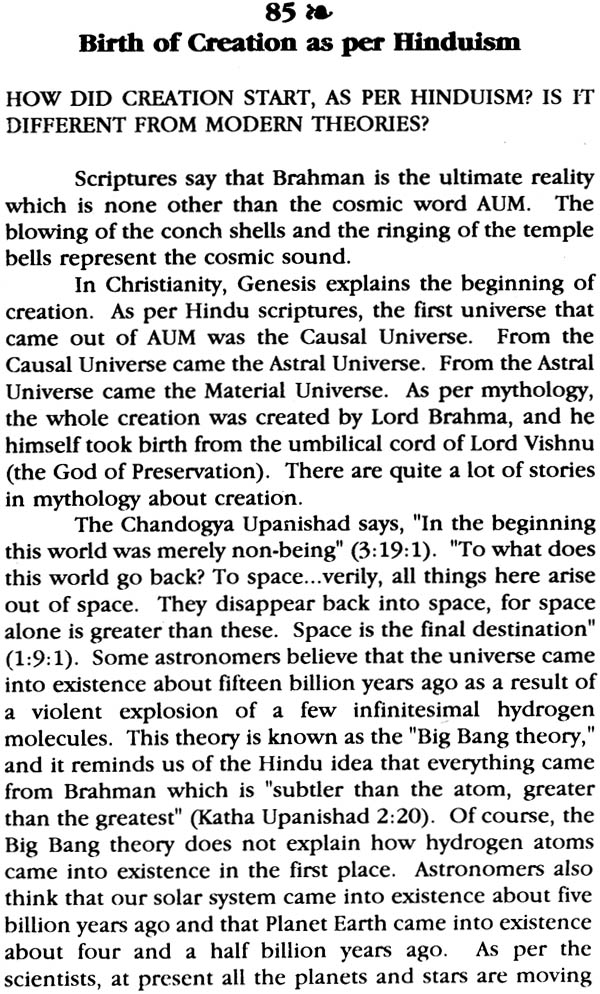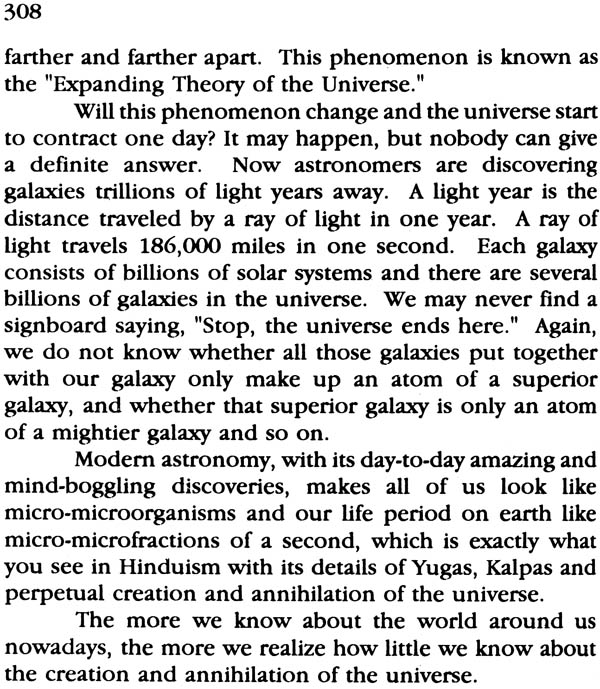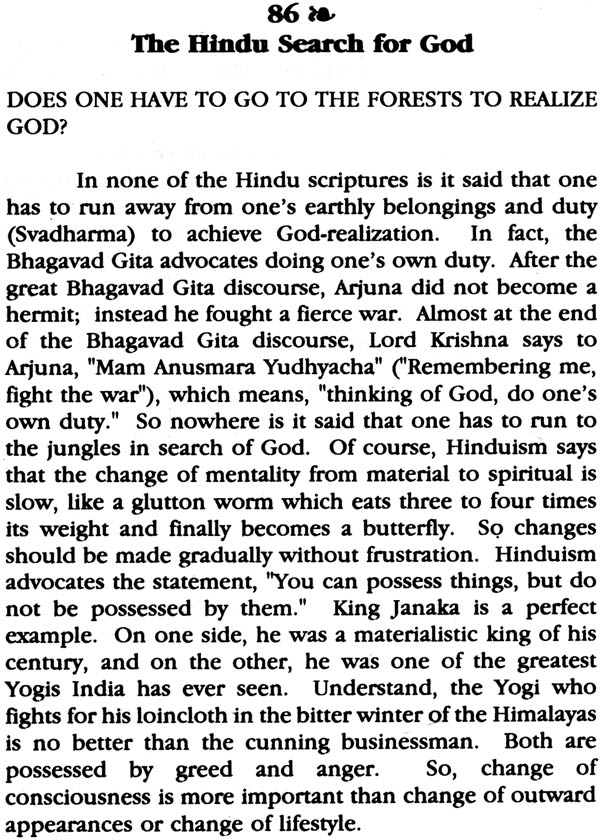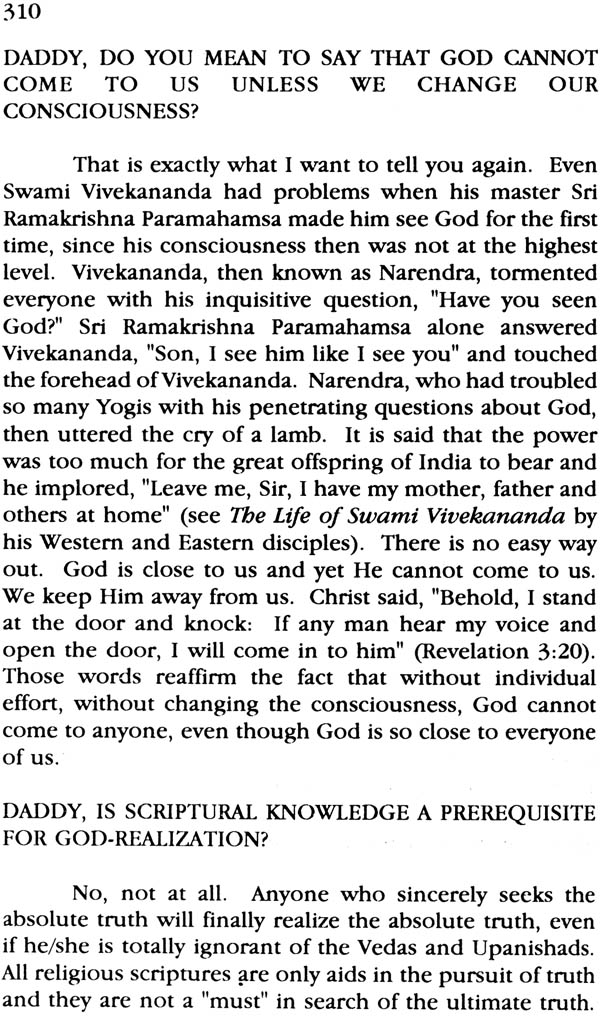
Am I A Hindu? (The Hinduism Primer)
Book Specification
| Item Code: | NAG303 |
| Author: | ED Viswanathan |
| Publisher: | Rupa Publication Pvt. Ltd. |
| Language: | English |
| Edition: | 1993 |
| ISBN: | 9788129119391 |
| Pages: | 335 |
| Cover: | Paperback |
| Other Details | 8.5 inch X 5.5 inch |
| Weight | 290 gm |
Book Description
Here at last is a lively, compelling and informative book on Hinduism. Tracing this belief system from its ancient riverbank origins to its present-day status as a major world religion, the book paints a comprehensive picture of Hinduism-its rituals, festivals and epic tales as well as its rigid caste system, its scriptures its relationship to Christianity and its significance in modern science. Most of all, Am I a Hindu? takes the reader on a journey of self-discovery as it asks-and answers-life’s most timeless and enduring questions.
One of the last major publishing vacuums--a definitive primer on Hinduism--is being filled by this book. Until now, American-born children of Hindu families have had no reliable literary guide to their own roots. Students of religion have been required to wade through voluminous texts, often on highly specific aspects of Hinduism.
You now hold a book that, in slightly over 300 pages, covers it all. Am I a Hindu? approaches the vast scope of Hinduism with thoroughness, clarity and understanding. The author, who has studied, practiced and experienced the many facets of Hinduism both in his native India and the United States, approaches the subject head-on: what it means to be a Hindu.
As Lord Krishna spoke to Arjuna on the battlefield of Kurukshetra, as the great risbis imparted wisdom to their disciples, so too this book is traditionally framed as an instructional discussion. The lively dialogue is between an American-born teenager and his father.
This highly readable, thought-provoking volume will ensure that Hinduism’s lofty ideals and profound wisdom remain in the minds and hearts of people everywhere.
Dear Readers:
For the last so many years I have been looking for a special book dealing with all aspects of Hinduism, one that would try to answer every conceivable question one could have on Hinduism and on life in general, but I found none. So after years of rigorous research and by the blessings of the Almighty I managed to write this book. I humbly wish to present this before you for your kind perusal.
My book is written in a “question and answer” format between a fourteen-year old American-born Indian teenager and his well-settled middle-aged father. Every part of Hinduism right from the Vedas all the way to the Trans is dealt with in this book. Throughout the book, the inquisitive son is grilling his father with all kinds of questions. All questions and answers are brief and direct.
All answers in this book are authentic. There is absolutely no dogma or demagoguery in the answers. Throughout this book I have repeatedly stated that Hinduism is a way of life and not an organized religion. In fact, Hinduism is the culture of Indians in India.
For my part I have read quite a number of books on Hinduism as well as on other religions. I feel all true religions of the world tell one and the same truth, but in Hinduism the truth is explored scientifically by a large number of ancient scientists called Rishis, who conducted all research without the use of a single test tube or a microscope.
I have absolutely no fanatical love affair with Hinduism and I am willing even to say that we should be ready to give up Hinduism if we can find a different source which will address all the problems in life and provide instant remedies. I do not mean to say that Hindu scriptures have answered every question to the satisfaction of all. My argument is that those scriptures have at least tried to answer every conceivable question one may have with the language of the Vedic age. Again we all know that we cannot understand in words that truth which is above the mind.
Even the very abstract scientific truths of today we are only understanding through equations and mathematics. Of course understanding is strictly personal and we understand things by way of comparison. When we talk about one object we compare it with another known object in order to understand it. For example, when I talk about the “fifth generation of computers,” you may think about robots and all those space adventure movies. If I talk about God, there is nothing to compare it with, so we try to compare it with natural powers like lightning and thunder or try to visualize the image of Jesus, Krishna, Moses, Buddha or Mahavira. So we all know how limited languages are in conveying truths, and as such, scriptures are not at fault if we cannot grasp the truths from them.
If all religions were made today, they would have been treated like physics or chemistry with universality in nature. Religions have airtight divisions not because of their prophets, but because of the fanatic work of the zealot followers. Neither Rishis nor Moses nor Buddha nor Christ nor Mohammed nor Guru Nanak intended their revelations to go to a chosen few, but to the whole of humanity. When they asked their followers to preach their word, they did not intend to destroy the existing schools of thought, but to strengthen the existing beliefs and practices. It is unimaginable to even think that Buddha or Christ could have said something different from Lord Krishna since there is only one truth and one God.
For example, I am of the opinion that the Hindu Maya and the Christian original sin are one and the same. Maya means illusion or false knowledge. According to Hinduism, we witness duality in the world such as “right and wrong,” “good and bad,” “yin and yang,” all due to Maya. If you look very deeply, you will see that the whole story of Adam and Eve in Genesis deals with Maya. God said to Adam that he could eat the fruits of every tree in the garden, except for the “tree of knowledge of good and evil” (Genesis 2:15). Adam disobeyed, and by eating that forbidden fruit Adam and Eve came to know right and wrong, good and bad, etc. That caused the downfall of man. That capability to discern right and wrong is the perception of duality in Hinduism, which is indeed Maya. What Adam and Eve attained in the garden by eating the forbidden fruit is “false knowledge,” and it is that false knowledge which is causing the downfall of every man. So Maya is indeed the original sin. That is the reason why man became aware of his nakedness in the Garden of Eden and lost the knowledge of his true nature. The serpent only depicts the inert weakness in the man which is to indulge in material things. There is no subject more liable to cause the Christian theologians to tear their hair out, and Christians to profess their outspoken disbelief, than the original sin. But if the Christian theologians would try to explain the original sin as false knowledge or Maya, many Christians would understand the magnanimity of the symbolism behind the story of Adam and Eve. Maya is indeed the original sin described in Genesis, and true knowledge is the only way to get rid of it.
My book may seem to you a mixture of many facts without a proper order. That is because Hinduism itself is a mixture of so many things. It is a summation of all types of thoughts and all types of religions. On one hand see the existence of the primitive worship of reptiles other pests, yet on the other hand you will see and ideas excelling Bohr’s theory of nuclear structure and reactions. This atmosphere is generated due to three reasons 1. Hinduism allowed and still allows the free flow of thoughts. 2. It allowed and still allows the coexistence of all kinds of thoughts. 3. Hinduism has never ever had a “house-cleaning” like other religions, which have had that periodically.
The objective behind writing this book is to open up the free thinking spirit in the reader as well as to open up the vast spiritual heritage of Hinduism to anyone who is interested in further research. I have tried to answer many questions in this book, but I know that understanding the ultimate truth is beyond the mind and as such beyond any verbal explanations. As a writer I can only repeat exactly what is written in ancient scriptures and explain them as I see and understand them.
I am dedicating this book to the poor and sick of India and contributing part of all profits from this book to charity because I believe that without food and proper health a person can never have knowledge, and at the same time ignorance is the root of all evils in the world.
I thank again the Almighty for giving me the opportunity to write this book. In fact I am only a compiler of facts and figures and I do not want to develop any unnecessary ego about this book, for as a great saint once said, “Ego is ego in whatever form it comes.” I thank you very much for taking time to read my humble book.
| Publisher’s Foreword | vii | |
| Preface | ix | |
| 1 | Introduction to Hinduism | 1 |
| 2 | Christianity in India | 19 |
| 3 | Birth and Development of Hinduism | 21 |
| 4 | Indology | 39 |
| 5 | Sruti and Smriti Literaturc | 41 |
| 6 | Rig Veda | 45 |
| 7 | Dharma Sutras | 53 |
| 8 | Code of Manu | 55 |
| 9 | Panchatantra and Artha Shastra | 61 |
| 10 | Charvaka--The Hindu Materialism | 63 |
| 11 | Brahma Sutras and Agamas | 65 |
| 12 | Jnana Yoga | 67 |
| 13 | Adi Sankara | 69 |
| 14 | The Ramayana | 77 |
| 15 | Yoga Vasishtha | 81 |
| 16 | The Mahabharata | 83 |
| 17 | Bhagavad Gita | 87 |
| 18 | Last Days of Lord Krishna | 93 |
| 19 | Puranas and Srimad Bhagavatam | 97 |
| 20 | Thirukural--Holy Bible of Saivites | 101 |
| 21 | Classical Music | 103 |
| 22 | Hindu Dances | 105 |
| 23 | Avatars in Detail | 109 |
| 24 | Avatars of Lord Vishnu | 111 |
| 25 | Ayurveda and Jyotisha | 115 |
| 26 | Hindu Mathematics | 119 |
| 27 | Bhakti Yoga | 121 |
| 28 | Bhakti Schools | 123 |
| 29 | Karma Yoga | 127 |
| 30 | Raja Yoga | 129 |
| 31 | Samadhi and the Koshas | 133 |
| 32 | What is Occultism? | 135 |
| 33 | Law of Karma and Reincarnation | 139 |
| 34 | Science of Reincarnation | 145 |
| 35 | AUM--The Word and Sound | 157 |
| 36 | Mantras and Mantra Yoga | 159 |
| 37 | Gayatri Mantra | ‘163 |
| 38 | Transcendental Meditation | 165 |
| 39 | What is Meditation? | 167 |
| 40 | Brain Waves and Biofeedback | 171 |
| 41 | Brain Electrical Impulses and Samadhi | 175 |
| 42 | Pranayama | 179 |
| 43 | Kriya Yoga and Hatha Yoga | 183 |
| 44 | Ashtanga Yoga and Laya Yoga | 185 |
| 45 | Easiest Form of Meditation | 187 |
| 46 | Tantras, Chakras and Kundalini Power | 191 |
| 47 | Sivalinga, Yantra and Mandala | 195 |
| 48 | Salagrama, Kumari Pooja, Mudra and Nyasa | 197 |
| 49 | Kama Sutra | 199 |
| 50 | Who is a Guru? | 201 |
| 51 | Idol Worship | 205 |
| 52 | Gods of Hinduism | 207 |
| 53 | Kali and Human Sacrifice | 215 |
| 54 | Rationality of Worship of Many Gods | 219 |
| 55 | Hindu Temple Construction | 221 |
| 56 | Mythology | 223 |
| 57 | The Cow and Hindus | 227 |
| 58 | Status of Women in Hinduism | 229 |
| 59 | Sati--The Most Horrendous Act | 237 |
| 60 | Hygiene and Aura | 241 |
| 61 | Ashrama Dharma and Non-Violence | 245 |
| 62 | Hindu Diet Code | 247 |
| 63 | Untouchables | 249 |
| 64 | Truth--A Virtue | 253 |
| 65 | Story of Ganges | 255 |
| 66 | Hindu Pilgrimages | 257 |
| 67 | Kumbha Mela Festival | 259 |
| 68 | Benaras--Holy City of Hindus | 261 |
| 69 | Hindu Holy Festivals | 263 |
| 70 | Hindu Rituals | 269 |
| 71 | Hindu Marriages | 273 |
| 72 | Mysterious & Brahman | 275 |
| 73 | “Aham Brahmasmin” and Other Mantras | 277 |
| 74 | “I Am God” | 279 |
| 75 | What Do You Mean By “Born Again”? | 285 |
| 76 | Sin in Hinduism | 287 |
| 77 | Maya--The Original Sin | 289 |
| 78 | Creation and Annihilation of the Universe | 291 |
| 79 | Pralaya--The Hindu Armageddon | 295 |
| 80 | Devils and Ghosts | 297 |
| 81 | The Swastika and Hinduism | 299 |
| 82 | Hare Krishnas | 301 |
| 83 | Drugs and Hinduism | 303 |
| 84 | Elements and Sacred Plants of Hinduism | 305 |
| 85 | Birth of Creation as per Hinduism | 307 |
| 86 | The Hindu Search for God | 309 |
| 87 | Day-to-Day Problems and Hinduism | 313 |
| 88 | Misrepresentation of Hinduism | 315 |
| 89 | Does Science Have Answers? | 317 |
| 90 | Concluding Advice | 319 |
